| | Mathison Museum of Natural History |  |
|
+15Caracal widukind lucky luke Megaptera rogerpgvg Jill sunny pipsxlch Saarlooswolfhound landrover Kikimalou Taos Duck-Anch-Amun Shanti Saien 19 posters |
|
| Author | Message |
|---|
Roger
Admin
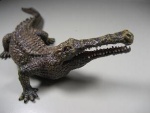
Country/State : Portugal
Age : 50
Joined : 2010-08-20
Posts : 35835
 |  Subject: Re: Mathison Museum of Natural History Subject: Re: Mathison Museum of Natural History  Thu Aug 31, 2023 10:33 am Thu Aug 31, 2023 10:33 am | |
| - rogerpgvg wrote:
- Whatever it is, it is a beautiful figure. I have one too and although it doesn't fit in my collection at all (scalewise) and it is unfortunate that it isn't a species-specific model, I just enjoy the wonderful sculpt. The combination of a hovering bird with a flower makes it special to me. Does anyone have any idea what the flower might be?
I doubt the flower is identifiable to the species level. Maybe someone can identify it but it won't be easy for sure. |
|
  | |
bmathison1972
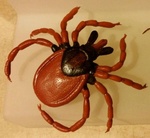
Country/State : Salt Lake City, UT
Age : 52
Joined : 2010-04-13
Posts : 6710
 |  Subject: Re: Mathison Museum of Natural History Subject: Re: Mathison Museum of Natural History  Thu Aug 31, 2023 2:38 pm Thu Aug 31, 2023 2:38 pm | |
| Species: Baliga micans (McLachlan, 1875) About the Figure: Manufacturer: Kaiyodo Series: Chocoegg Animatales Series 3 Year of Production: 2000 Size/Scale: Body length (excluding appendages) approximately 3.8 cm for a scale of 4.5:1-3:1 Frequency of species in toy/figure form (at time of posting): Unique Miscellaneous Notes: This figure was marketed as Hagenomyia micans. Being one of the original Chocoegg Animatales figures, some assembly is required. About the Animal: Geographic distribution: East Asia (Japan, southern China, Korean Peninsula, Vietnam) Habitat: Forest margins, grasslands Diet: Larvae are ambush predators on ants and other small terrestrial arthropods; adults feed on pollen and nectar IUCN Status (at time of posting): Not Evaluated Miscellaneous Notes: Like many other antlions, larvae of B. micans are ambush predators that construct pitfall traps to catch prey. When the pit is completed, the larva settles down at the bottom, buried in the soil with only the jaws projecting above the surface, often in a wide-opened position on either side of the very tip of the cone. The steep-sloped trap guides prey into the larva's mouth while avoiding crater avalanches. Slipping to the bottom, the prey is immediately seized by the lurking antlion; if it attempts to scramble up the walls of the pit, it is speedily checked in its efforts and brought down by showers of loose sand which are thrown at it from below by the larva. [You must be registered and logged in to see this image.] |
|
  | |
widukind
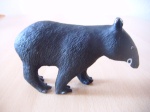
Country/State : Germany
Age : 48
Joined : 2010-12-30
Posts : 45745
 |  Subject: Re: Mathison Museum of Natural History Subject: Re: Mathison Museum of Natural History  Thu Aug 31, 2023 5:46 pm Thu Aug 31, 2023 5:46 pm | |
| |
|
  | |
bmathison1972

Country/State : Salt Lake City, UT
Age : 52
Joined : 2010-04-13
Posts : 6710
 |  Subject: Re: Mathison Museum of Natural History Subject: Re: Mathison Museum of Natural History  Fri Sep 01, 2023 12:46 pm Fri Sep 01, 2023 12:46 pm | |
| Species: Gavialis gangeticus (Gmelin, 1789) Common name(s): gharial; gavial About the Figure: Manufacturer: Papo Series: Wild Animals Year of Production: 2013 Size/Scale: Body length approximately 22.3 cm for a scale of 1:11.5-1:20 for a female or 1:13.3-26.7 for a male Frequency of species in toy/figure form (at time of posting): Rare Miscellaneous Notes: This is the only standard-sized G. gangeticus figure I am aware of; all others are small/tube-sized. About the Animal: Geographic distribution: Fragmented areas in the northern Indian Subcontinent (northern India, Nepal, and possibly Bangladesh) Habitat: Clear, freshwater rivers Diet: Juveniles eat aquatic invertebrates, small fish, amphibians; adults are specialists on fish IUCN Status (at time of posting): Critically Endangered Miscellaneous Notes: With its very long snout and narrow, small, interlocking teeth, G.gangeticus is very well adapted for hunting fish. Gharials are also known to have swallowed stones, either as gastroliths to aid in breaking up food (since most prey is swallowed whole) or possibly to aid in buoyancy. [You must be registered and logged in to see this image.] |
|
  | |
Roger
Admin

Country/State : Portugal
Age : 50
Joined : 2010-08-20
Posts : 35835
 |  Subject: Re: Mathison Museum of Natural History Subject: Re: Mathison Museum of Natural History  Fri Sep 01, 2023 6:18 pm Fri Sep 01, 2023 6:18 pm | |
| |
|
  | |
landrover
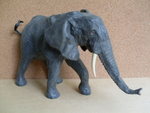
Country/State : colombia
Age : 66
Joined : 2010-11-04
Posts : 5890
 | |
  | |
Caracal
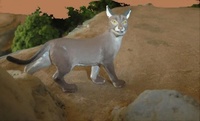
Country/State : France
Age : 65
Joined : 2018-10-24
Posts : 7252
 |  Subject: Re: Mathison Museum of Natural History Subject: Re: Mathison Museum of Natural History  Fri Sep 01, 2023 11:38 pm Fri Sep 01, 2023 11:38 pm | |
| Very fine display for a good model!   There is an other standar scale from Schleich.
Last edited by Caracal on Sat Sep 02, 2023 3:28 pm; edited 1 time in total |
|
  | |
bmathison1972

Country/State : Salt Lake City, UT
Age : 52
Joined : 2010-04-13
Posts : 6710
 |  Subject: Re: Mathison Museum of Natural History Subject: Re: Mathison Museum of Natural History  Sat Sep 02, 2023 4:21 am Sat Sep 02, 2023 4:21 am | |
| I knew this would be a popular one on this forum  I didn't know Schleich made one as well |
|
  | |
Roger
Admin

Country/State : Portugal
Age : 50
Joined : 2010-08-20
Posts : 35835
 |  Subject: Re: Mathison Museum of Natural History Subject: Re: Mathison Museum of Natural History  Sat Sep 02, 2023 11:12 am Sat Sep 02, 2023 11:12 am | |
| I didn't mention the Schleich model because there is a debat on forum, very interesting, suggesting it to be a false gharial instead. You can find [You must be registered and logged in to see this link.] and I find it quite plausible. |
|
  | |
widukind

Country/State : Germany
Age : 48
Joined : 2010-12-30
Posts : 45745
 |  Subject: Re: Mathison Museum of Natural History Subject: Re: Mathison Museum of Natural History  Sat Sep 02, 2023 11:23 am Sat Sep 02, 2023 11:23 am | |
| |
|
  | |
bmathison1972

Country/State : Salt Lake City, UT
Age : 52
Joined : 2010-04-13
Posts : 6710
 |  Subject: Re: Mathison Museum of Natural History Subject: Re: Mathison Museum of Natural History  Sat Sep 02, 2023 2:30 pm Sat Sep 02, 2023 2:30 pm | |
| That Schleich toy is way too generic I think. Next up: Species: † Eldredgeia venustus Lieberman, 1993 About the Figure: Manufacturer: Paleocasts Series: Trilobite Cast Collection Year of Production: 2018 Size/Scale: Body length approximately 5.2 cm, within scale 1:1 Frequency of species in toy/figure form (at time of posting): Unique Miscellaneous Notes: Paleocasts is a line of prehistoric animals, mainly invertebrates, produced by artist Patrick May and sold on Etsy in the U.S. The figures can usually be purchased finished (as shown here) or unfinished. About the Animal: Geographic distribution: Middle Devonian (Givetian) or present-day South America Habitat: Marine, benthic Diet: Presumably scavenger or predator on other invertebrates IUCN Status (at time of posting): N/A [prehistoric] Miscellaneous Notes: Eldredgeia venustus belongs to the phacopine group (Phacopida: Phacopina) characterized by having schizochroal eyes. Schizochroal eyes typically had fewer (around 700), yet larger lenses. This, in combination with field of view (all-around) vision and elevated eye placement suggests their eyes were used for altering the animal of would-be predators rather than for hunting prey. Phacopines also had more efficient enrollment mechanisms for defense against would-be predators. [You must be registered and logged in to see this image.] |
|
  | |
bmathison1972

Country/State : Salt Lake City, UT
Age : 52
Joined : 2010-04-13
Posts : 6710
 |  Subject: Re: Mathison Museum of Natural History Subject: Re: Mathison Museum of Natural History  Sun Sep 03, 2023 1:08 pm Sun Sep 03, 2023 1:08 pm | |
| Species: Vanessa atalanta (Linnaeus, 1758) Common name(s): red admiral About the Figure: Manufacturer: Bullyland Series: Butterflies on Strings Year of Production: 1998 Size/Scale: Wingspan approximately 6.5 cm for a scale slightly over 1:1 for a large specimen (range 4.4-6.4 cm) Frequency of species in toy/figure form (at time of posting): Rare Miscellaneous This is the second time we've seen V. atalanta in the Museum. The 'Butterflies on Strings' collections were two sets of butterflies released by Bullyland. The figures had a loop of chord attached to the top of the thorax via a screw (hence the unsightly hole), so they can hang from things. There are eight figures in this set, with four sculpts shared among them (and the shape of the wings isn't always accurate for the assigned species, as seen here today). The set was also sold as 'swingers', with the figures suspended on a wire attached to a base. About the Animal: Geographic distribution: Holarctic; naturalized in Bermuda, Hawaii, the Azores, and Canary Islands Habitat: Woodlands, forest margins, marshes, moist fields, suburban parks and gardens Diet: Larvae feed on a variety of plants; common host plants include Urtica (nettles), Parietaria (pellitory), Boehmeria (false nettle), and Humulus (hops); adults feed on fermenting fruit, bird droppings, tree sap, and nectar from a variety of flowers, especially AsteraceaeIUCN Status (at time of posting): Least Concern (in North America its NatureServe rank is Secure) Miscellaneous Notes: Vanessa atalanta is a migratory species. In Europe, populations emigrate from northern and central Europe to the Mediterranean region to overwinter. In the spring, the northern range is recolonized by migrants from the south. In North America, the phenomenon hasn't been studied as well, but populations in the northern US and Canada migrate south, possibly as far as Mexico where the species can be found year-round. [You must be registered and logged in to see this image.] |
|
  | |
Roger
Admin

Country/State : Portugal
Age : 50
Joined : 2010-08-20
Posts : 35835
 |  Subject: Re: Mathison Museum of Natural History Subject: Re: Mathison Museum of Natural History  Sun Sep 03, 2023 1:47 pm Sun Sep 03, 2023 1:47 pm | |
| - bmathison1972 wrote:
- That Schleich toy is way too generic I think.
Actually that's a very toyish model and its chubby style might contribute to the perception that it is a false gharial instead. Though, I continue thinking this is a plausible identification but for sure this is not the ultimate model. |
|
  | |
widukind

Country/State : Germany
Age : 48
Joined : 2010-12-30
Posts : 45745
 |  Subject: Re: Mathison Museum of Natural History Subject: Re: Mathison Museum of Natural History  Sun Sep 03, 2023 7:35 pm Sun Sep 03, 2023 7:35 pm | |
| |
|
  | |
Jill

Country/State : USA
Age : 39
Joined : 2021-04-13
Posts : 2349
 |  Subject: Re: Mathison Museum of Natural History Subject: Re: Mathison Museum of Natural History  Sun Sep 03, 2023 9:19 pm Sun Sep 03, 2023 9:19 pm | |
| The gharial is a really cool figure! What a good looking guy. They are such a fantastic looking creature, it seems like there would be more larger figures of them.
The Baliga micans is also a cool looking figure, certainly an animal I have never heard of before. It's always cool to see something that hasn't been represented otherwise show up! |
|
  | |
bmathison1972

Country/State : Salt Lake City, UT
Age : 52
Joined : 2010-04-13
Posts : 6710
 |  Subject: Re: Mathison Museum of Natural History Subject: Re: Mathison Museum of Natural History  Mon Sep 04, 2023 2:16 pm Mon Sep 04, 2023 2:16 pm | |
| Species: Bos taurus Linnaeus, 1758 Common name(s): Jersey cattle About the Figure: Manufacturer: CollectA Series: Farm Time Year of Production: 2023 Size/Scale: Height at withers (shoulders) approximately 7.0 cm for a scale of 1:16.4-1:17.1 Frequency of breed in toy/figure form (at time of posting): Uncommon Miscellaneous Notes: To my knowledge, this is CollectA's first attempt at this breed (although they released a calf alongside it), but it's been made several times previously, most notably by Britains, Safari Ltd., Mojö Fun, and Reisler. Most of those companies have produced cows, bulls, and calves. Schleich is slated to release a cow in 2024 as well. About the Animal: Geographic distribution: The breed originated in the Bailiwick of Jersey in the British Channel Islands and today is bred in much of the world where dairy cattle are raised. Habitat: Fields, meadows, pastures Diet: Grazer on grasses IUCN Status (at time of posting): Domesticated Miscellaneous Notes: The Jersey originated on the British Channel Island of Jersey from cattle stock from Normandy. The first records of the breed date back to around 1740 A.D., but the breed is much older. Between 1789 and 2008, the importation of other breeds to the island was prohibited to maintain the purity of the breed, essentially leaving the Jersey genetically isolated for over 200 years. Some cattle believed to be Jersey came to America with early settlers in 1657, but the breed didn't become popular in the United States until the 1850s. The Jersey was bred for its milk, which is rich in butterfat, and today is very popular in places where butter is a major product, including the United States, New Zealand, and Denmark. [You must be registered and logged in to see this image.]
Last edited by bmathison1972 on Sat Sep 09, 2023 4:39 am; edited 1 time in total |
|
  | |
widukind

Country/State : Germany
Age : 48
Joined : 2010-12-30
Posts : 45745
 |  Subject: Re: Mathison Museum of Natural History Subject: Re: Mathison Museum of Natural History  Mon Sep 04, 2023 6:03 pm Mon Sep 04, 2023 6:03 pm | |
| |
|
  | |
bmathison1972

Country/State : Salt Lake City, UT
Age : 52
Joined : 2010-04-13
Posts : 6710
 |  Subject: Re: Mathison Museum of Natural History Subject: Re: Mathison Museum of Natural History  Tue Sep 05, 2023 12:40 pm Tue Sep 05, 2023 12:40 pm | |
| Species: Chalcosoma atlas (Linnaeus, 1758) Common name(s): Atlas beetle About the Figure: Manufacturer: 4D Master Series: Bug & Creature World Year of Production: 2004 Size/Scale: Body length (including cephalic horn) approximately 8.7 cm, within scale 1:1 Frequency of species in toy/figure form (at time of posting): Uncommon Miscellaneous Notes: This is the second time we've seen C. atlas in the Museum (it's not as commonly made as the related C. chiron). Being a puzzle figure, substantial assembly is required. This particular toy comes in 19 pieces and according to the paperwork that accompanies it, one is a beginner if they can assemble it in 6 minutes, average in 4 minutes, and advanced in 2 minutes. The color is somewhat unnatural for this species, even for a teneral specimen. About the Animal: Geographic distribution: Southeast Asia Habitat: Primary and secondary tropical broadleaf forests, plantations Diet: Larvae feed in decaying wood and detritus; adults feed on tree sap and overripe fruit IUCN Status (at time of posting): Not Evaluated Miscellaneous Notes: There are roughly seven subspecies of C. atlas distributed throughout Southeast Asia. Those subspecies and their geographic distributions are: C. a. atlas (Sulawesi), C. a. butonensis (Buton Island), C. a. keyboh (Malaysia and Sumatra), C. a. mantetsu (Thailand and Vietnam), C. a. simeuluensis (Simeule Island), C. a. sintae (Peleng Islands), and C. a. hesperus (Philippines). [You must be registered and logged in to see this image.] |
|
  | |
Caracal

Country/State : France
Age : 65
Joined : 2018-10-24
Posts : 7252
 | |
  | |
widukind

Country/State : Germany
Age : 48
Joined : 2010-12-30
Posts : 45745
 |  Subject: Re: Mathison Museum of Natural History Subject: Re: Mathison Museum of Natural History  Wed Sep 06, 2023 7:09 am Wed Sep 06, 2023 7:09 am | |
| |
|
  | |
bmathison1972

Country/State : Salt Lake City, UT
Age : 52
Joined : 2010-04-13
Posts : 6710
 |  Subject: Re: Mathison Museum of Natural History Subject: Re: Mathison Museum of Natural History  Wed Sep 06, 2023 12:37 pm Wed Sep 06, 2023 12:37 pm | |
| Species: Cystidia truncangulata Wehrli, 1934 About the Figure: Manufacturer: Kaiyodo Series: Capsule Q Museum - Caterpillars Vol. 2 Year of Production: 2014 Size/Scale: Body length approximately 8.0 cm for a scale of 3.2:1-2.2:1 Frequency of species in toy/figure form (at time of posting): Unique Miscellaneous Notes: This figure has a wire in it, so it can be bent into different positions (although I have never tried to manipulate it for fear of breakage). Figures in this set were also sold as straps, but the chord easily unscrews leaving a tiny, non-obtrusive hole at the posterior end. About the Animal: Geographic distribution: East Asia (Japan, northeast China, Korean Peninsula) Habitat: Forests, woodlands Diet: Larvae feed on plants in the genera Celstrus (staff vine) and Euonymus (spindle tree). I couldn't find any information on the adults, but I speculate they do not feed. IUCN Status (at time of posting): Not Evaluated Miscellaneous Notes: All three developmental stages (larva, pupa, and adult) of Cystidia species have aposematic coloration to warn would-be predators they are distasteful. [You must be registered and logged in to see this image.] |
|
  | |
widukind

Country/State : Germany
Age : 48
Joined : 2010-12-30
Posts : 45745
 |  Subject: Re: Mathison Museum of Natural History Subject: Re: Mathison Museum of Natural History  Wed Sep 06, 2023 6:24 pm Wed Sep 06, 2023 6:24 pm | |
| |
|
  | |
Saarlooswolfhound
Moderator

Country/State : USA
Age : 28
Joined : 2012-06-16
Posts : 12055
 |  Subject: Re: Mathison Museum of Natural History Subject: Re: Mathison Museum of Natural History  Thu Sep 07, 2023 12:05 am Thu Sep 07, 2023 12:05 am | |
| I have some caterpillars now too but I admit they still make my skin crawl a bit when I look at them for too long.  Very nice little yellow friend Blaine! _________________ -"I loathe people who keep dogs. They are cowards who haven’t got the guts to bite people themselves."-August Strindberg (However, anyone who knows me knows I love dogs [You must be registered and logged in to see this image.] ) -“We can try to kill all that is native, string it up by its hind legs for all to see, but spirit howls and wildness endures.”-Anonymous |
|
  | |
bmathison1972

Country/State : Salt Lake City, UT
Age : 52
Joined : 2010-04-13
Posts : 6710
 |  Subject: Re: Mathison Museum of Natural History Subject: Re: Mathison Museum of Natural History  Thu Sep 07, 2023 12:44 pm Thu Sep 07, 2023 12:44 pm | |
| Species: Thomisus onustus Walckenaer, 1805 Common name(s): pink crab spider About the Figure: Manufacturer: Club Earth Series: Spiders to Go Year of Production: unknown Size/Scale: Body length 3.9 cm for a scale of 5.6:1-3.5:1 for a female specimen (see below) Frequency of species in toy/figure form (at time of posting): Very rare (see below) Miscellaneous Notes: The Club Earth spiders are marked with a common name on the underside. Today's is only marked 'crab spider' and the identification is mine based on color and shape, and that the species in set were all featured in the Golden Guide Spiders and their Kin (I have the 1990 edition). Popular books in the 1990s were often the influence for companies such as Play Visions and Club Earth. Thomisus onustus exhibits marked sexual dimorphism and these spiders appear to have been sculpted after females. The pink figure on the upper right is by Club Earth; the blue figure on the lower left is from a set by an unknown manufacturer. This unknown set of spiders consists of 12 species that were all produced by Club Earth or Play Visions (or both). While the sculpts are not 100% identical to those by either CE or PV, they are also stamped with the common name on the underside, so there is little question where the influence came from (although the sculpts are much more similar to those by CE rather than PV). In this case, the color doesn't appear to be accurate in the alternate figure. While T. onustus can be variable in color, I cannot find any records of it being blue. About the Animal: Geographic distribution: Widespread in much of the Palearctic Habitat: Heathland, fields, meadows, forest clearings; usually on flowers of low, shrubby vegetation and herbs Diet: Ambush predator on flower-visiting insects and other spiders; when prey is scarce, the diet may be supplemented with pollen as a starvation survival strategy IUCN Status (at time of posting): Not Evaluated Miscellaneous Notes: Thomisus onustus is a master of camouflage as a 'sit-and-wait' (ambush) predator on flying insects that visit flowers, and can take down prey many times their own size. They commonly sit on flowers in the family Asteraceae. They have the ability to change color to match the flower they are sitting on, and are usually various shades of pink, yellow, or white. [You must be registered and logged in to see this image.] |
|
  | |
widukind

Country/State : Germany
Age : 48
Joined : 2010-12-30
Posts : 45745
 |  Subject: Re: Mathison Museum of Natural History Subject: Re: Mathison Museum of Natural History  Thu Sep 07, 2023 6:07 pm Thu Sep 07, 2023 6:07 pm | |
| |
|
  | |
Sponsored content
 |  Subject: Re: Mathison Museum of Natural History Subject: Re: Mathison Museum of Natural History  | |
| |
|
  | |
| | Mathison Museum of Natural History |  |
|
